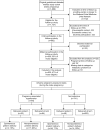Pregnancy-Associated Hypertension in Glucose-Intolerant Pregnancy and Subsequent Metabolic Syndrome
- PMID: 26959208
- PMCID: PMC4805433
- DOI: 10.1097/AOG.0000000000001353
Pregnancy-Associated Hypertension in Glucose-Intolerant Pregnancy and Subsequent Metabolic Syndrome
Abstract
Objective: To evaluate whether pregnancy-associated hypertension (preeclampsia or gestational hypertension) among women with varying degrees of glucose intolerance during pregnancy is associated with maternal metabolic syndrome 5-10 years later.
Methods: This was an observational cohort study of women previously enrolled in a treatment trial of mild gestational diabetes mellitus or an observational study of lesser degrees of glucose intolerance evaluated 5-10 years after their index pregnancy. At follow-up, women underwent anthropometric and blood pressure measurements and analysis of fasting glucose and serum lipids.
Results: A total of 825 women (47% of eligible women from the original study) were included in this analysis and evaluated at a median 7 years after their index pregnancy at a median age of 35 years. Overall, 239 (29%) had subsequent metabolic syndrome. The frequency of metabolic syndrome and its components was highest in the women who had pregnancy-associated hypertension and delivered preterm. After adjusting for confounding factors, pregnancy-associated hypertension in women who delivered preterm was associated with subsequent hypertension (130/85 mm Hg or greater; relative risk 3.06, 95% confidence interval [CI] 1.95-4.80, P<.001), high triglycerides (150 mg/dL or greater; relative risk 1.82, 95% CI 1.06-3.14, P=.03), and metabolic syndrome (per the American Heart Association and National Heart Lung and Blood Institute Scientific Statement; relative risk 1.78, 95% CI 1.14-2.78, P=.01) compared with women who remained normotensive throughout their index pregnancy and were delivered at term.
Conclusion: Women with varying degrees of glucose intolerance who experienced pregnancy-associated hypertension and then delivered preterm had a higher frequency of subsequent hypertension, high triglycerides, and metabolic syndrome 5-10 years later.
Figures


References
-
- Kim C, Newton KM, Knopp RH. Gestational diabetes and the incidence of type 2 diabetes: a systematic review. Diabetes Care. 2002;25:1862–8. - PubMed
-
- Kaaja RJ, Greer IA. Manifestations of chronic disease during pregnancy. JAMA. 2005;294:2751–7. - PubMed
-
- McDonald SD, Malinowski A, Zhou Q, Yusuf S, Devereaux PJ. Cardiovascular sequelae of preeclampsia/eclampsia: a systematic review and meta-analyses. Am Heart J. 2008;156:918–30. - PubMed
Publication types
MeSH terms
Substances
Grants and funding
- U10 HD040500/HD/NICHD NIH HHS/United States
- UG1 HD027869/HD/NICHD NIH HHS/United States
- U10 HD040544/HD/NICHD NIH HHS/United States
- UG1 HD040560/HD/NICHD NIH HHS/United States
- UG1 HD053097/HD/NICHD NIH HHS/United States
- U10 HD040485/HD/NICHD NIH HHS/United States
- HD40485/HD/NICHD NIH HHS/United States
- HD40560/HD/NICHD NIH HHS/United States
- U10 HD027869/HD/NICHD NIH HHS/United States
- HD34116/HD/NICHD NIH HHS/United States
- UL1 TR000439/TR/NCATS NIH HHS/United States
- U10 HD040560/HD/NICHD NIH HHS/United States
- UL1TR000439/TR/NCATS NIH HHS/United States
- U10 HD040512/HD/NICHD NIH HHS/United States
- U01 HD036801/HD/NICHD NIH HHS/United States
- UL1 TR001070/TR/NCATS NIH HHS/United States
- HD36801/HD/NICHD NIH HHS/United States
- UG1 HD034116/HD/NICHD NIH HHS/United States
- HD27869/HD/NICHD NIH HHS/United States
- UL1TR001070/TR/NCATS NIH HHS/United States
- UG1 HD027915/HD/NICHD NIH HHS/United States
- HD40512/HD/NICHD NIH HHS/United States
- UG1 HD040544/HD/NICHD NIH HHS/United States
- UG1 HD034208/HD/NICHD NIH HHS/United States
- UG1 HD040512/HD/NICHD NIH HHS/United States
- HD40545/HD/NICHD NIH HHS/United States
- U10 HD034116/HD/NICHD NIH HHS/United States
- U10 HD027915/HD/NICHD NIH HHS/United States
- UG1 HD040545/HD/NICHD NIH HHS/United States
- UG1 HD040485/HD/NICHD NIH HHS/United States
- HD40500/HD/NICHD NIH HHS/United States
- U10 HD034208/HD/NICHD NIH HHS/United States
- U10 HD053097/HD/NICHD NIH HHS/United States
- HD34208/HD/NICHD NIH HHS/United States
- HD27915/HD/NICHD NIH HHS/United States
- UG1 HD040500/HD/NICHD NIH HHS/United States
- P2C HD050924/HD/NICHD NIH HHS/United States
- U24 HD036801/HD/NICHD NIH HHS/United States
- U10 HD036801/HD/NICHD NIH HHS/United States
- HD53097/HD/NICHD NIH HHS/United States
- U10 HD040545/HD/NICHD NIH HHS/United States
- HD40544/HD/NICHD NIH HHS/United States
LinkOut - more resources
Full Text Sources
Other Literature Sources
Medical

